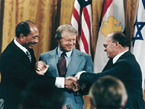With a large Egyptian military buildup ongoing on the Sinai Peninsula, and coup-like consolidation of power to the Muslim Brotherhood over the weekend, Egypt is now refusing to speak to Israel. After last week’s attack on the Israeli border by Islamist militants operating out of the Sinai, Israel agreed to ease the restrictions of the 1979 peace treaty on Egyptian military operations in the Sinai, hoping Egypt would be able to bring the increasing lawlessness on the peninsula under control.
“It is too early to say what will happen because everything is evolving in Egypt, but we are following what is happening there with great concern”, said an Israeli government official. “Military cooperation is more necessary than ever to re-establish order along the border and in Sinai. The new leadership in the Egyptian army knows that, but the question is what does the Egyptian leadership want? This question has not yet been answered because the new Egyptian government is refusing all contact with Israel”.
The 1979 treaty demilitarized the Sinai Peninsula, placing restrictions on troop numbers and restricting arms to light weapons only. However, last week’s attack on the Israeli border which resulted in the deaths of 16 Egyptian soldiers caused Israel to ease these restrictions, allowing Egypt to operate against the militant Islamist groups which have found relative safe haven there – a move causing both countries to herald the high degree of cooperation they were able to achieve. Over the last week, tanks, helicopters, armored vehicles and troops have poured into the Sinai from Egypt as a result of the temporary agreement.
However, over the weekend, Egyptian president Morsi made incredible changes to the Egyptian government, sweeping away the vestiges of the Mubarak regime and consolidating power for the Muslim Brotherhood. Along with the “high degree of cooperation,” two casualties of the shakeup were Field Marshal Hussein Tantawi and the army’s Chief of Staff Sami Anan, key relationships for Israel.
Alex Fishman, a defense commentator, said in Israel’s Yediot Aharonot, “Several Egyptian officials who were “retired” by Morsi had close working relations with their Israeli counterparts over a period of many years. The personnel changes may have an adverse effect on the diplomatic and security relations between the neighboring countries. The damage caused to Egypt’s pro-West and secular military may eventually jeopardize the peace treaty with Israel…the processes in Egypt are so dynamic, fast and unexpected, that it is difficult to predict what the relationship between Israel and Egypt will seem like in a few months’ time”.

COMMENTS
Please let us know if you're having issues with commenting.